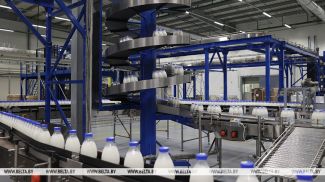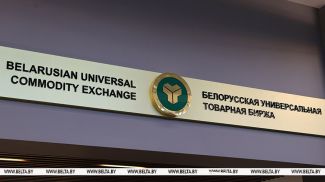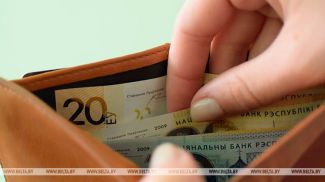MOGILEV, 17 January (BelTA) – The establishment of a Belarusian-Japanese technological cluster, an enterprise to process peat, and joint ventures to make textiles was mentioned as prospects of cooperation when Ambassador Extraordinary and Plenipotentiary of Japan to Belarus Hiroki Tokunaga met with Mogilev Oblast Governor Leonid Zayats on 17 January, BelTA has learned.
The governor said: “We've seen tight interaction between Mogilev Oblast and Japan in the last few years, primarily in social sphere. Unfortunately, the level of our trade and economic relations is not that high, this is why we would like to fix the shortcoming. Representatives of Japan could visit the region and we could work on the concrete avenues our partners are interested in.”
Chairman of the International Affairs and National Security Commission of the Council of the Republic of the National Assembly of Belarus Sergei Rakhmanov agreed that relations between the sides could use more economic projects. In his words, a Belarusian-Japanese business association is being established and will be able to help achieve this goal. The body is supposed to help executive authorities, in particular, authorities in Belarusian regions, to establish contacts between the two countries and fill it with content.
The senator stressed: “We are intent on implementing specific projects. We would like to use the free economic zone Mogilev to set up a structure like the Belarusian-Japanese industrial cluster and commission a number of enterprises. One of them may help OAO Mogotex expand the choice of textile products. Taking into account interests of the Japanese market, it may be a good idea to set up a number of comparatively small enterprises around OAO Mogotex to make goods for sport, fishing, hunting, and so on. The production of humate or peat-based fertilizers to spur plant growth and development is another promising business avenue. Humates have a high added value and sell well on Asian markets.”
In January-November 2019 trade between Mogilev Oblast and Japan amounted to $2.676 million (15.8% up), with export at $242,600 (54.5% down) and import at $2.434 million (nearly 37% up). The main products exported to Japan were gelatin and furniture while the main imports were lathe machines, medical equipment, artificial fibers, and organic substances.
In 2019 Mogilev Oblast started exporting to Japan such products as wooden goods and sawn timber. The Domostroenie branch of the Shklov-based newsprint mill is implementing a pilot project to make prefabricated wooden houses to be used during emergencies in Japan. ARTEC Company is the Japanese partner in the project. In August 2019 the Belarusian company signed a $65,000 contract to make and erect two frame-panel houses and one cafй.
According to Hiroki Tokunaga, Mogilev Oblast has every chance of becoming the leading Belarusian region in advancing economic relations with Japan in the future. “Mogilev Oblast is far from Minsk and Japanese citizens are in no hurry to visit the region for now,” the ambassador said. “We have to implement some successful joint project to give a boost to future relations and attract the interest of the Japanese business community. It is necessary to work towards closer economic interests.”
At present Mogilev Oblast and Japan vigorously cooperate in social sphere: in the area of culture, education, tourism, and healthcare. Six projects worth over $474,600 have been implemented in Mogilev Oblast in the last few years thanks to Japan's Grant Assistance for Grassroots Human Security Projects (GGP) Program.













